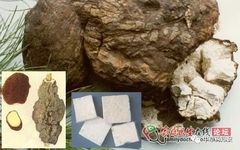Herb Name: Fu Ling (Poria)
Alias: Yun Ling
Harvesting and Processing: In the second or third year, harvested from July to September in pine forests. After digging, remove the soil and pile it up to ‘sweat’ before spreading it out to dry until the surface is dry, then ‘sweat’ again, repeating several times until wrinkles appear and most of the internal moisture is lost, then air-dried, referred to as ‘Fu Ling Ge’; or fresh Fu Ling can be cut into different parts and air-dried, referred to as ‘Fu Ling Pi’ (Fu Ling skin) and ‘Fu Ling Kuai’ (Fu Ling pieces).
Medicinal Part: Dried sclerotium
Origin: Yunnan, Anhui, Hubei, Henan
Family: Polyporaceae
Original Plant: Fu Ling (Poria)
Plant Type: Fungus
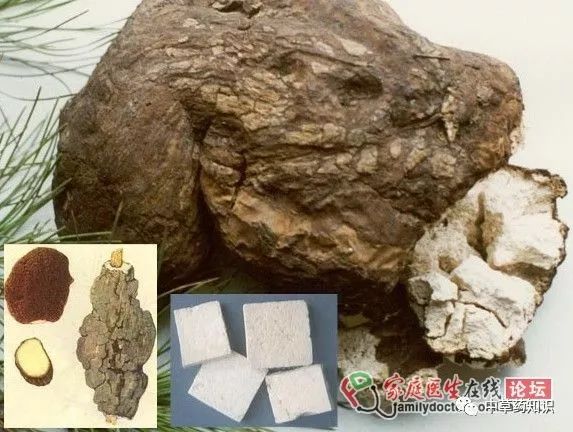
Grows on pine roots, the sclerotium is spherical, oval, elliptical, or irregular in shape, measuring 10-30 cm or longer, with varying weights, generally weighing between 500-5000 g.
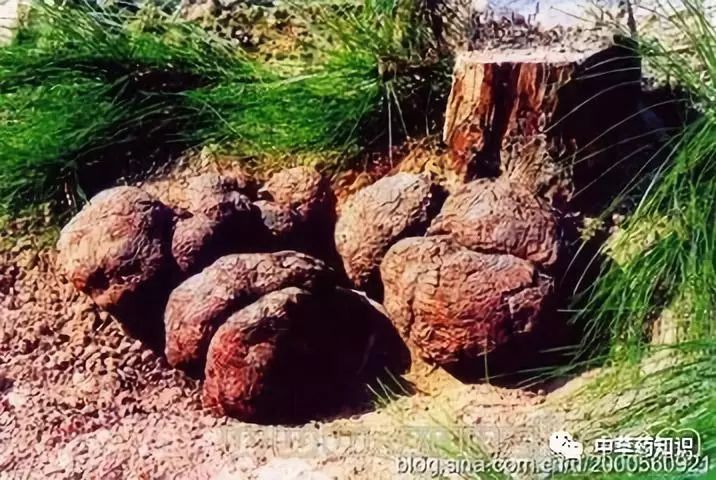
The outer shell is thick and wrinkled, dark brown, soft when fresh but hardens later.
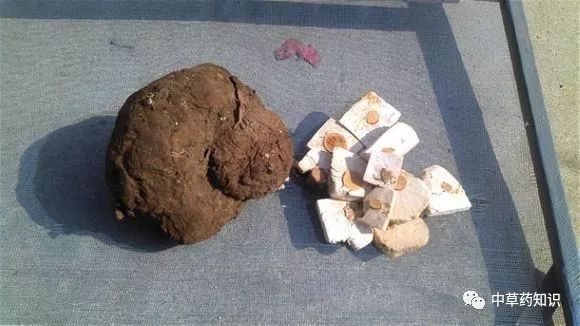
The interior is white or light pink, granular. The fruiting body grows on the surface of the sclerotium, is flat, 3-8 cm thick, white, fleshy, and turns light brown when old or dried. The tubes are densely packed, 2-3 mm long, with thin walls, and the openings are round, polygonal, or irregular, measuring 0.5-1.5 cm in diameter, with serrated edges.
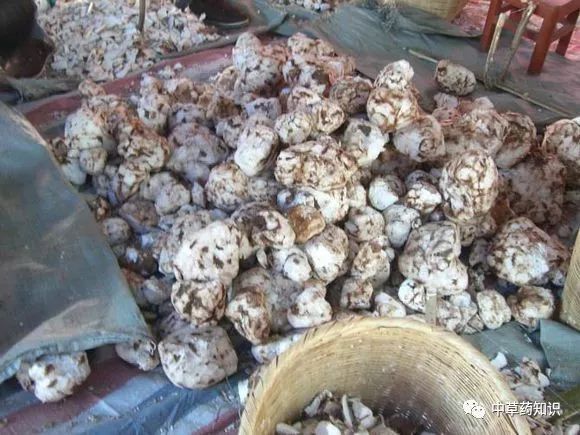
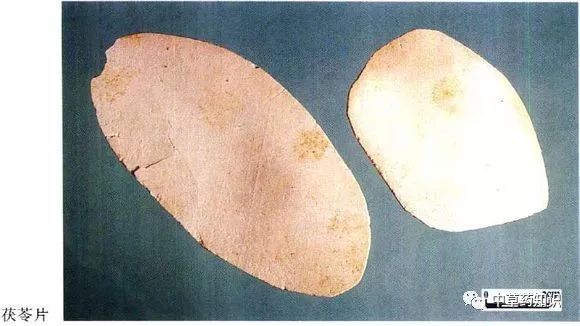
Quality specimens are solid, with a brown outer skin, fine skin texture, no cracks, and a delicate white cross-section that produces bubbles when immersed in water, with strong adhesive properties.
Inferior specimens may be mixed with gypsum or starch to increase weight, appearing overly white due to added starch. Fu Ling powder is repressed and cut.
Fu Ling Properties: “[Shennong’s Herbal Classic, Superior Grade] Fu Ling is sweet and neutral. It is used for chest and flank qi stagnation, anxiety, palpitations, pain below the heart, cold and heat, fullness, cough, dry mouth, and thirst. Long-term use calms the spirit and nourishes the mind, preventing hunger and prolonging life.”
Sweet in flavor, neutral in nature, it enters the channels of the Stomach (Zu Yangming), Spleen (Zu Taiyin), Kidney (Zu Shaoyin), and Bladder (Zu Taiyang). It promotes urination, dries dampness, resolves phlegm, calms palpitations, alleviates fullness, relieves irritability from sweating, and quenches thirst from fluid retention; it is a miraculous remedy for dysuria and diarrhea, and an excellent medicine for uterine bleeding and leukorrhea; it effectively treats both qi distension and water retention, as well as reverse stomach and esophageal obstruction; it is effective for numerous ailments and has a wide range of applications.
Fire is located above, and water below; water is cold and moistens downwards, while fire is hot and inflames upwards. In human life, fire and water must interact; when they do, fire is generated in the Kan (water) and water does not become cold, while water is generated in the Li (fire) and fire does not become hot. The interaction of water and fire gives rise to dampness, with earth positioned in the middle, hence its damp nature. Fire is dry and water is damp, which is the nature of things. Earth is born from fire, and the dampness of earth is realized in water. The interaction of water and fire relies entirely on earth; when the earth rotates left, Kan Yang rises in the east to transform into fire; when Wu earth rotates right, Li Yin descends in the west to transform into water. Water and fire are mutually rooted; when cold and heat interact, the stomach does not become overly dry, and the spleen does not become overly damp, achieving balance between yin and yang, thus preventing disease.
Nothing can exist without decline. When fire is strong, earth becomes dry; when water is abundant, earth becomes damp. If water cannot overcome fire, then dampness cannot overcome dryness; however, Ding and Gui are in the same palace, and Ding fire cannot resist the cold of Gui water; Wu and Ji are parallel, yet Wu earth cannot resist the dampness of Ji earth. In human decline, fire diminishes while water increases, dryness decreases while dampness increases, which is the general principle. When earth dampness is not mobilized, ascending and descending are reversed, water and wood sink and cold arises, fire and metal rise and heat occurs, all diseases arise from this; from now on, yang fire gradually diminishes, and yin water gradually increases. When fire recovers and earth is born, humans survive; when water is abundant and earth collapses, humans perish. Thus, Zhang Zhongjing taught that the one who bears the burden of the Shaoyin is in accordance with the order. Earth dominance is in accordance, while water dominance is contrary; ancient sages dried the earth to control water, while later craftsmen nourished water and harmed earth, showing the vast difference between the wise and the foolish.
Dampness diseases of the earth are primarily found in the Yangming channel, while dampness occupies half of the others, which are rarely seen. Among the internal injuries and miscellaneous diseases, there are none like this. Later craftsmen opened the door to nourish yin and supplement water, while medicine is like a saw and axe, and humans are like morning mushrooms.
All internal injury diseases, such as qi distension and water retention, cough with phlegm, diarrhea, dysuria, vomiting, bleeding, hernia, jaundice, stroke, mania, palpitations, reverse stomach and esophageal obstruction, diarrhea, acid reflux, bone steaming, closed menstruation, cholera, abdominal pain, wind-cold cough, and various illusions, all arise from dampness of the earth. Fu Ling drains water and dries dampness, harmonizes and disperses, suitable for all diseases, making it an excellent medicine. Daoists claim it has longevity effects, which is not an exaggeration.
Later craftsmen use milk, which is the most erroneous and uncommunicative.
[Preparation] Take Fu Ling Ge, soak, wash, moisten, slightly steam, and then cut the skin and pieces or cut into thick slices and dry.
[Properties] Sweet, bland, neutral.
[Meridians Entered] Heart, Lung, Spleen, Kidney.
[Functions and Indications] Promotes urination and drains dampness, strengthens the spleen and calms the heart. Used for edema, reduced urination, phlegm retention, dizziness, spleen deficiency with reduced appetite, loose stools, anxiety, and insomnia.
[Dosage] 9-15 g.
[Storage] Store in a dry place, prevent moisture.
Previous Recommendations:
1. Jiao Gu Lan (Gynostemma)
2. Bai Man Tuo Luo (White Datura)

